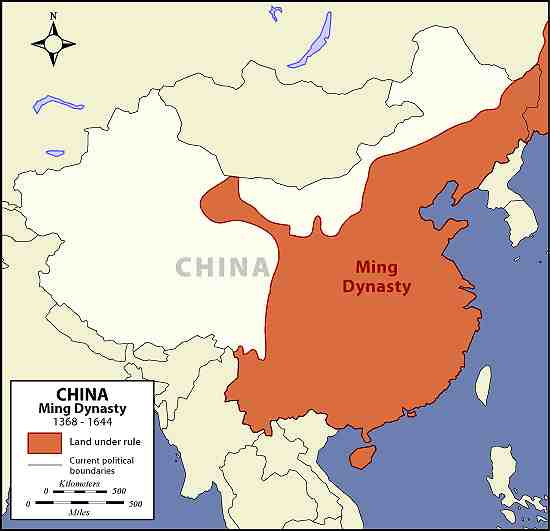So after the Mongols rolled into China and set up shop with their own dynasty, the whole steppe and a chunk of what we now call Siberia ended up being tied pretty closely to the Chinese empire.
But if you pull up a map today, you’ll notice China ends quite low—and except for Mongolia, all that land’s Russian now. So… what happened?
How did China end up losing such a massive chunk of Siberia to Russia?
Alright, so by the time Kublai Khan was done, the Mongol-led Yuan dynasty was fully in control of all that land. But his successors? Not exactly rockstars. Before long, the Yuan dynasty collapsed and basically got downgraded to a client state under the newly rising Ming dynasty.
Meanwhile, over to the east, the Gurchins were holding it down in what we now call Manchuria. By the late 1500s, Ming power was falling apart over there too, and the Gurchins took advantage—going independent and setting up their own Jin dynasty.
Fast forward to the 1630s, the Gurchins had a bit of a rebrand—they became the Manchus—and after taking out the last bits of the northern Yuan, they turned their eyes on China, which was dealing with rebellions (as usual). While that was happening, some new neighbors started poking around the northern borders: the Russians.
And, it didn’t take long for things to get tense. But the Jin (basically ming got replaced by jin) were too busy trying to conquer China to deal with it just yet. Beijing fell in 1644, and the Jin had another PR moment—voilà, the Qing dynasty (the jin dynasty changed their name to Qing) was born. Over the next few decades, they brought most of China under their control. During all this Qing expansion, the Russians were quietly sneaking into Manchuria, and the Qing were not having it. So yeah—war.
It didn’t go well for the Russians. Their ruler at the time—well, technically it was Sophia who was calling the shots—decided to cut her losses. She wanted to focus on backstabbing young Peter the Great, so she pushed for peace.

The two sides made a deal: Russia acknowledged China’s border as stretching here, and in return, they got to trade. Win-win, sort of. A few decades later, another treaty came along that officially set the border near Mongolia, and both sides seemed cool with it. For a while.
Then, surprise twist—it’s the British and the French! After Russia got smacked in the Crimean War, they saw a golden opportunity when the British and French turned their sights on China in 1856.
The Qing were busy dealing with the Second Opium War, so Russia sent troops and settlers into the Amur region. China wasn’t thrilled, but honestly, they didn’t have much bandwidth to push back.
Here’s where Russia played it smart. China didn’t want to talk annexations, so Russia cozied up to the British, French, and Americans to play “honest broker.”
The U.S. was already tight with Russia, and the other three… not so much. So the Qing figured this was probably as fair as it was gonna get.
Enter Nikolai Ignatiev, Russia’s ambassador to China and a bit of a genius in turning the tables. He told the Qing emperor the Allies would only accept a peace deal if Russia said it was fair—and Russia would only say that if they got a sweet deal out of it. That sweet deal? Land. Lots of it. The Qing, begrudgingly, agreed.
And just to rub salt in the wound, four years later, another treaty handed Russia even more land in Central Asia. So, case closed, right? Nope. Unsurprisingly, the Chinese weren’t thrilled.
They saw those treaties not as fair agreements between equals but as straight-up power plays. Which… they kind of were.
When the Qing dynasty finally collapsed, Mongolia broke away. Not long after, Tuva broke off from Mongolia. Russia—well, the empire, then republic, then Soviet Union—basically scooped it up as their own protectorate, then straight-up annexed it.
After World War II and the Chinese Civil War, Mao Zedong came to power and wasn’t exactly a fan of Russia holding what he considered rightful Chinese land.
Mao figured that since they were all communists now, maybe the Soviets would hand back some of that territory to prove they weren’t just another imperialist power. Spoiler: they didn’t. So what could Mao do? Well… he could start a border war. And in 1969, that’s exactly what he did.
We’re not totally sure what his endgame was, but things escalated fast—so fast it almost went nuclear. In the end, not much changed, aside from a lot of grieving mothers.
The tensions dragged on, and besides a few tiny tweaks after the Soviet Union fell apart, the border has mostly stayed the same. Those Siberian lands? Still very much Russian today.







Great article (except spelling “All right” the wrong way!)